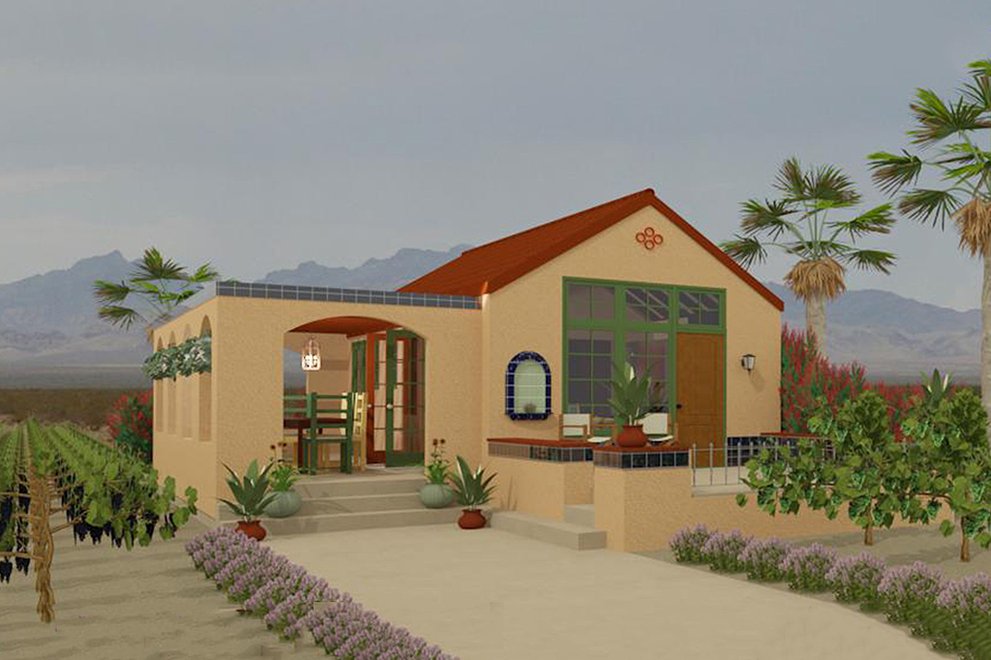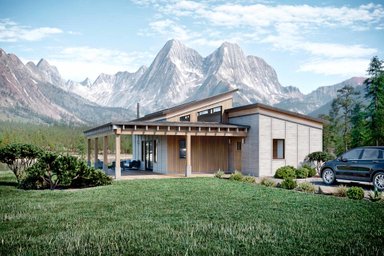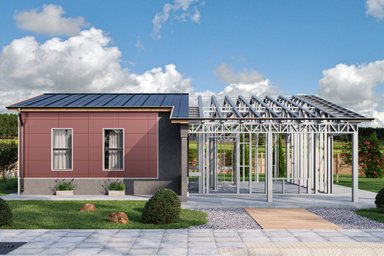Comparing energy-efficient hot water heaters probably isn’t on your green homebuilding to-do list. But, wait a minute! Water heating is the second biggest expense in your home, and the average family uses 64 gallons of water a day and spends $400 to $600 a year on hot showers and clean dishes and laundry. It’s time to check out the most energy-savvy options available.
Size up the situation
The first thing to do is to figure out your family’s peak-hour hot water demand, and then discuss options with your general contractor. If your water utility offers a free online service to manage your monthly water usage, sign up and use the data to calculate the size of tank you need.
Research your options
Contractors and plumbers understand conventional storage hot water systems, but some of them are not familiar with more sustainable options like tankless (on-demand) or solar hot water heaters. Don’t let them talk you out of using technologies they don’t understand. Be proactive—do your own research and meet with reputable installation contractors who can help you calculate the right size system for your home and know how to integrate it with the plumbing.
Shop for heating systems
There are five types of water heaters available: conventional storage, tankless (on-demand), heat pump, tankless coil and indirect, and solar.
Conventional storage water heaters, which run on electricity, natural gas, propane or fuel oil, are relatively inexpensive to install and run. But, they waste energy keeping gallons of water heated 24/7 and lose heat due to lack of tank insulation. New, high-efficiency gas-powered models and gas condensing water heaters (that use heat generated from combustion gases to help heat the water) are more energy-efficient options.
Tankless (on-demand) water heaters, which are powered by natural gas, electricity or propane, heat your water without using a storage tank and are eight to 34 percent more energy efficient than storage heaters. However, they have limited flow rates, which can mean cooler water during simultaneous multiple uses or when there are long distances between the heater and your showerhead. Installing two tankless systems can solve the problem, though the energy savings might not offset purchase and installation costs.
Heat pump water heaters use electricity, natural gas or geothermal energy (heat from the Earth) to heat water. These units are two to three times more energy efficient than a conventional storage water heater. However, they work best in areas where the temperature is between 40 and 90°F all year, and they exhaust cold air. Consult a knowledgeable professional for more details.
Tankless coil and indirect water heaters use your home’s space heating system to heat water and run on electricity, natural gas, fuel oil or propane. Advantages include lower installation and maintenance costs, but they are not a good choice for warmer climates. Talk to an installation contractor for more information.
Solar water heaters, which heat water using the sun’s energy, are fifty percent more efficient than electric or gas water heaters. But, the initial investment is higher, and some people install a backup system (or budget water use) during cloudy days and peak-demand times. Have a solar hot water professional visit your site to see how much sun it receives, discuss system options, and tell you about available rebates and incentives.
Fuel Source, Energy Star
Today’s water heating systems are powered by electricity, natural gas, propane, fuel oil, geothermal or solar depending on the type of heater. Your property location determines which fuel sources are available to you.
After comparing energy-efficient hot water heaters, costs, life expectancy, pros and cons and fuel sources (check out Energy.gov’s helpful infographic), you can decide which is the best choice for your family. As you consider appliances, look for the Energy-Star label -- denoting high-efficiency -- on gas storage water heaters, gas condensing water heaters, whole-home gas tankless water heaters, heat pump water heaters and solar water heaters. Choosing the right hot water heater for your needs can not only save energy, water, and money, but it can help you enjoy a hot shower with a clean conscience knowing that you are putting less stress on the environment.
Click here to browse a collection of energy efficient floor plans.
Size up the situation
The first thing to do is to figure out your family’s peak-hour hot water demand, and then discuss options with your general contractor. If your water utility offers a free online service to manage your monthly water usage, sign up and use the data to calculate the size of tank you need.
Research your options
Contractors and plumbers understand conventional storage hot water systems, but some of them are not familiar with more sustainable options like tankless (on-demand) or solar hot water heaters. Don’t let them talk you out of using technologies they don’t understand. Be proactive—do your own research and meet with reputable installation contractors who can help you calculate the right size system for your home and know how to integrate it with the plumbing.
Shop for heating systems
There are five types of water heaters available: conventional storage, tankless (on-demand), heat pump, tankless coil and indirect, and solar.
Conventional storage water heaters, which run on electricity, natural gas, propane or fuel oil, are relatively inexpensive to install and run. But, they waste energy keeping gallons of water heated 24/7 and lose heat due to lack of tank insulation. New, high-efficiency gas-powered models and gas condensing water heaters (that use heat generated from combustion gases to help heat the water) are more energy-efficient options.
Tankless (on-demand) water heaters, which are powered by natural gas, electricity or propane, heat your water without using a storage tank and are eight to 34 percent more energy efficient than storage heaters. However, they have limited flow rates, which can mean cooler water during simultaneous multiple uses or when there are long distances between the heater and your showerhead. Installing two tankless systems can solve the problem, though the energy savings might not offset purchase and installation costs.
Heat pump water heaters use electricity, natural gas or geothermal energy (heat from the Earth) to heat water. These units are two to three times more energy efficient than a conventional storage water heater. However, they work best in areas where the temperature is between 40 and 90°F all year, and they exhaust cold air. Consult a knowledgeable professional for more details.
Tankless coil and indirect water heaters use your home’s space heating system to heat water and run on electricity, natural gas, fuel oil or propane. Advantages include lower installation and maintenance costs, but they are not a good choice for warmer climates. Talk to an installation contractor for more information.
Solar water heaters, which heat water using the sun’s energy, are fifty percent more efficient than electric or gas water heaters. But, the initial investment is higher, and some people install a backup system (or budget water use) during cloudy days and peak-demand times. Have a solar hot water professional visit your site to see how much sun it receives, discuss system options, and tell you about available rebates and incentives.
Fuel Source, Energy Star
Today’s water heating systems are powered by electricity, natural gas, propane, fuel oil, geothermal or solar depending on the type of heater. Your property location determines which fuel sources are available to you.
After comparing energy-efficient hot water heaters, costs, life expectancy, pros and cons and fuel sources (check out Energy.gov’s helpful infographic), you can decide which is the best choice for your family. As you consider appliances, look for the Energy-Star label -- denoting high-efficiency -- on gas storage water heaters, gas condensing water heaters, whole-home gas tankless water heaters, heat pump water heaters and solar water heaters. Choosing the right hot water heater for your needs can not only save energy, water, and money, but it can help you enjoy a hot shower with a clean conscience knowing that you are putting less stress on the environment.
Click here to browse a collection of energy efficient floor plans.






